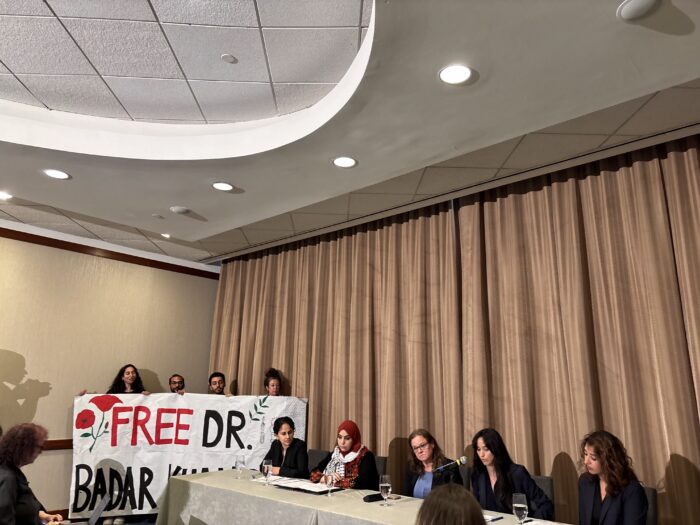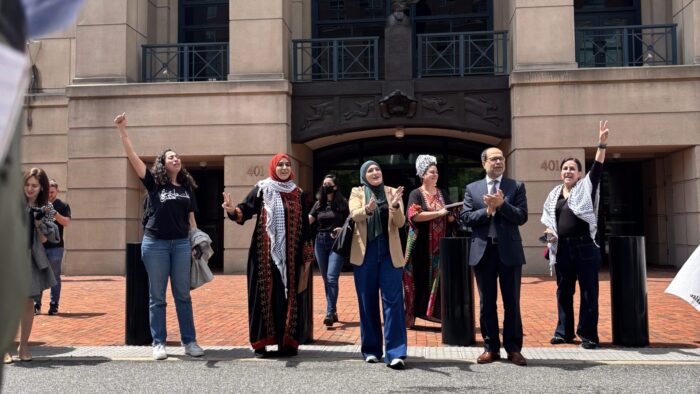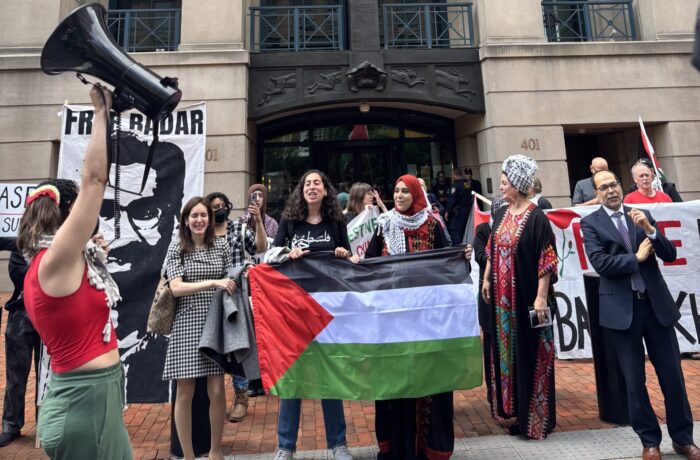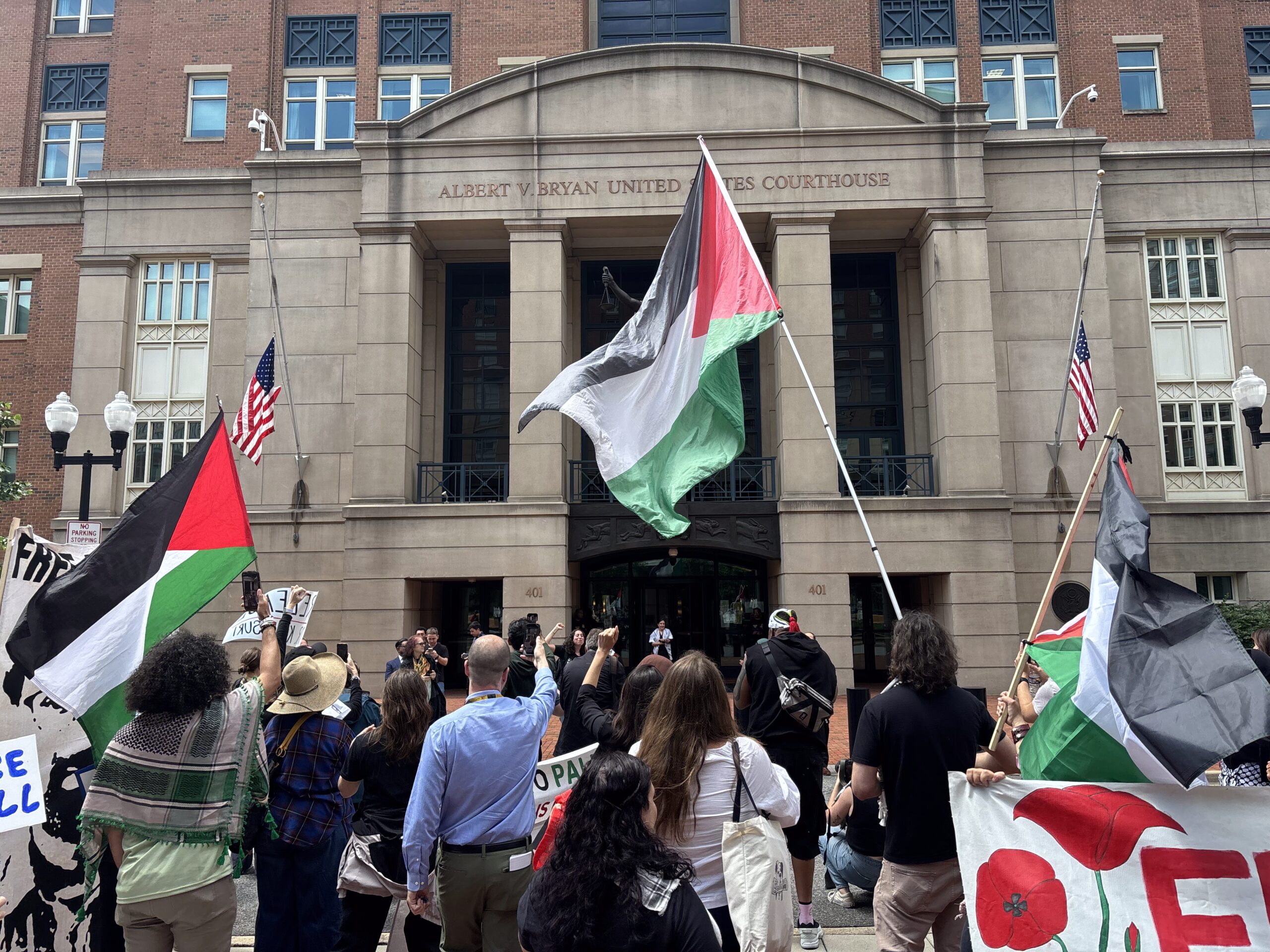A federal judge ordered the release of Dr. Badar Khan Suri, a Georgetown postdoctoral fellow, in a hearing on May 14. Khan Suri has been held in an Immigration and Customs Enforcement (ICE) detention facility in Alvarado, Texas, since March 21, following his arrest outside his home on March 17.
At the hearing, which took place at 10 a.m. at the district court for the Eastern District of Virginia, Khan Suri’s legal team argued that he is not a flight risk nor does he pose imminent risk to his community if released, meaning he would meet the requirements for release on bond until his trial. The courtroom was filled with supporters wearing keffiyehs, and Khan Suri’s wife, Mapheze Ahmad Saleh (MSFS ’26), sat in the front row.
Khan Suri, a fellow at Georgetown’s Alwaleed Bin Talal Center for Muslim-Christian Understanding, is an Indian national who is legally in the United States through an exchange visa. In March, Khan Suri was detained outside his home in Rosslyn, Virginia while returning home from Iftar, a meal where Muslims break their fast during Ramadan.
After his arrest, Khan Suri’s lawyers filed a petition alleging that the Trump administration violated his free speech rights under the First Amendment and right to due process, or habeas corpus, under the Fifth Amendment. In the petition, his team alleges that his detainment is retaliation for free speech and familial ties to Hamas.
On Wednesday, Patricia Tolliver Giles, U.S. district judge for the Eastern District of Virginia, ruled that Khan Suri should be released on a $0 bond, on the conditions that he remain in Virginia, attend all court hearings, and participate in separate removal proceedings. She asked federal lawyers that Khan Suri not be re-detained and that there be no GPS monitoring of his location upon his release.
In a press conference after the hearing, Khan Suri’s legal team said that they have lawyers on the ground in Texas who have informed Khan Suri of his release. In the press conference, Sophia Gregg, one of Khan Suri’s lawyers, said that he is “kind, patient, calm, and devoted.”

Photo by Alaena Hunt Khan Suri’s team and his wife sit at a press conference after the ruling Photo by Alaena Hunt
Khan Suri’s legal team’s arguments centered around the fact that Khan Suri, who studies peacebuilding, shows no behaviors that would point to him harming anyone upon his release.
“Dr. Khan Suri is not a danger to anyone. To the contrary, he has never been arrested, charged, or even accused of any crime,” his legal team wrote in a May 12 filing.
Lawyers representing the Trump administration countered that he was both a threat to his community and a flight risk but provided no evidence of a crime or past behavior to support their assertions. In a May 12 filing, Trump administration lawyers emphasized that in order for a petitioner to be released on bond, they must show a “high probability of success” in the judge ruling in their favor in the case. However, the Trump administration argued that Khan Suri does not have a high likelihood of success because they deem his detainment to be completely legal.
“Suri’s claims are inextricably intertwined with the commencement of his removal proceedings, and Suri makes no meaningful effort to distinguish his purported challenges to his detention from the merits of those removal proceedings,” the filing says. “Success on the merits has not clearly been shown, and the Court should deny Suri’s pending motions.”
If he was granted bail, lawyers representing the Trump administration said that the court should require $10,000 in bond.
During her ruling, Giles spoke about how the Trump administration was unable to provide substantial evidence to the court, and that she believes Khan Suri does have a high likelihood of success in proving that his constitutional rights were violated.
Giles previously denied a motion by the federal government to transfer Khan Suri’s trial to Texas, where he is currently detained. While the federal government argued that Khan Suri’s team should have filed his petition in Texas or Louisiana, where he had been detained, Giles wrote that Khan Suri’s legal team was not given adequate information as to where he was being held at the time his petition was filed, and that his subsequent moves to detention centers around the country could be seen as “forum shopping” to land his case in a court more favorable to the government.
After his detainment, according to a memorandum filed by his legal team, ICE officials told Khan Suri that he was being arrested because “someone at a very high level at the Secretary of State’s office did not want him to be in the country.” Khan Suri’s lawyers argue that his detention is retaliation for his familial ties to Hamas.
Khan Suri is married to Saleh, a U.S. citizen primarily raised in Gaza. Saleh’s father, according to a 2018 Hindustan Times interview, was a “senior political advisor” to Hamas. Saleh’s father left the group and publicly condemned its attacks on Israel on Oct. 7, 2023, calling them a “terrible error.” In February, CAMERA on Campus, a nonprofit dedicated to “defending Israel against hostility and distortions on campus,” released an article about her family connections, leading Saleh to become the target of online scrutiny.
In a May 12 filing, Khan Suri’s team alleged that holding him in detention only continues to violate his right to due process, and that any eventual ruling on his case will be weakened with every day he is held.
“His separation from his family, his separation from his research, teaching, and other scholarly pursuits, the complete restrictions on his liberty, and the harsh conditions of confinement he is enduring, all while demonstrating the extraordinary nature of his situation and the substantial constitution violations his case presents, render each day of detention an irremediable harm,” Khan Suri’s team wrote on May 12. “Any ultimate success on his habeas claims will be a hollow victory if he is first required to endure months or years of difficult confinement.”
Khan Suri’s team also argued that, given they allege that his right to due process was violated, he must be released so that the undue harm of his detention is not continued until his hearing.
“He will suffer irreparable harm every day that he is being detained, his rights are being violated,” Khan Suri’s team said in the courtroom.
In a separate May 12 court filing, Saleh spoke about the impact that her husband’s detention has had on their family.
“My kids ask me about their father day and night. I still cannot bring myself to give our young twins a real answer about where their father is,” Saleh wrote. “Our 9-year-old son has been affected the most. He is especially close to his father, Badar. To him, Badar is more than just a father; he is his friend, and they share everything together. However, now that his father is inaccessible and detained by ICE, he is unable to open up to anyone. It has been hard to watch my eldest child, who used to speak prolifically, go silent and struggle to string together a single statement.”
Saleh also spoke about how her husband’s detention has affected his family abroad.
“Badar’s detention is having a devastating impact on his own parents in India. His father has had major cardiac issues since Badar’s detention and has needed immediate medical care. Badar’s parents sob through each of my phone calls with them,” she wrote. “In the limited time I am able to speak to Badar, I oftentimes try to connect him with his elderly parents in India.”
Khan Suri’s legal team also noted that his detention was in line with hundreds of other arrests of non-citizens across the country, which they argue are meant to intimidate those who have spoken out against the United States government and its actions abroad, specifically its military assistance to Israel.
“His release is in the public interest, his detention would continue to have a chilling impact on the country,” his lawyer said.
In a May 12 filing, Khan Suri’s legal team argued that his detention was meant to inspire fear in other American citizens, and as a result it presents extraordinary circumstances that should lead to a release on bond.
“Because Dr. Khan Suri’s current detention is punitive and intended to chill his speech and the speech of others, and because traditional bond factors weigh in favor of release, this case presents extraordinary circumstances that require release on bond while this case is pending, in order for habeas relief to be meaningful,” the filing says.
Following the ruling, demonstrators celebrated outside the courthouse. A woman on a megaphone hugged another demonstrator as they delivered the news, and together, the crowd started cheering.

Photo by Alaena Hunt Khan Suri’s legal team and wife deliver the news to demonstrators outside the courthousePhoto by Alaena Hunt
In an interview with the Voice, one of Khan Suri’s friends, who is also an adjunct professor at Georgetown, said that the ruling was a positive development in what has been a difficult time. The professor asked to remain anonymous due to concerns about safety in the current political environment.
“It’s a sigh of relief for sure, and it’s still a long road ahead. It’s a step of many, but at least we’re moving in the right direction,” the professor said.
He emphasized that he found the Trump administration’s claims that Khan Suri represented a threat if released to be totally false.
“I find it absurd that he is, in any way, shape, or form, a danger,’ he said. “He’s a very welcoming, very inviting guy, always with his family, and so I just think there’s no reason to think that there would be anything negative from him.”
In a press conference after the hearing, Saleh thanked supporters of Khan Suri’s release.
“I thank everyone who came out to support the cause of truth telling, speaking up, and standing for Palestinian rights,” Saleh said. “Your support restores my hope for freedom, my trust in justice—not only for Badar, but for all students and academics and all oppressed around the world.”

Photo by Alaena Hunt Saleh, right, stands outside the courthouse, holding a Palestinian flagPhoto by Alaena Hunt
Saleh expressed gratitude for the judge’s decision and the eventual return of her husband. As Giles handed down her ruling, one of Khan Suri’s lawyers looked back and winked at Saleh as someone sitting next to her gave her a hug.
“Hearing the judge’s words brought tears to my eyes. I wish I could give her a heartfelt hug from me and from my three children, who long to see their father,” Saleh said.
She also spoke about her husband’s commitment to peace, and emphasized that she does not believe he committed any crime or poses a threat to her fellow Americans.
“Badar told me, ‘If my suffering in the detention center is because I’m married to a Palestinian and because I spoke out against the genocide in Gaza, then I should wear it as a badge of honor,’” Saleh said. “Let me say this out loud: Badar’s beliefs are not a threat, as the U.S. government is claiming. Badar is a scholar, a researcher, and a lover of freedom, truth, and justice. I am proud to be his wife and the mother of his three children.”







